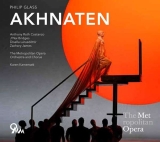Die minimalistische Oper Akhnaten (deutsch: Echnaton) von Philip Glass wurde 1984 in Stuttgart uraufgeführt. Der Text ist in Englisch, sowie in ägyptischer und akkadischer Sprache, letztere mit Pyramidentexten und Texten aus der Amarnazeit. Akhnaten erzählt vom Aufstieg und Fall des legendären ägyptischen Pharaos, aber eine durchgehende Handlung gibt es nicht. Die Oper besteht eigentlich aus portraitierenden Momentaufnahmen.
Die Musik ist über weite Strecken ruhig fließend und wird in einigen dramatischen Szenen bewegter und rhythmisch akzentuiert. Charakteristisch ist der etwas dunkle Klang, der dadurch kommt, dass es in der Partitur keine Violinen gibt. Nur die tiefen Streicher sind übrig geblieben, weil der Komponist das Orchester reduzieren musste, um es im Orchestergraben des Kleinen Hauses in Stuttgart unterbringen zu können. Der große Saal wurde 1984 gerade renoviert.
Diese Glass-Oper wird nun in einer Live-Aufnahme der New Yorker Met aus dem Jahre 2019 vorgelegt. Karen Kamensek hält die Zügel straff und gibt der minimalistischen Musik viel Spannung. Das Orchester spielt in diesem Stück die Hauptrolle, das Vokale ist gewissermaßen nur Verzierung. Unter Kamensek entwickelt sich die Musik dynamisch und mit einem kontinuierlichen Drive, selbst in den langsameren Teilen. Das lässt sie auch ohne das Bühnengeschehen, das opulent gewesen muss, wie die Photos im Booklet zeigen, zu einem starken Musikerlebnis werden. Wer dennoch die Oper als ganze Produktion sehen will, kann auch die DVD zurückgreifen, die ebenfalls erhältlich ist.
Philip Glass’s minimalist opera Akhnaten was premiered in Stuttgart in 1984. The text is in English, as well as Egyptian and Akkadian, the latter with pyramid texts and texts from the Amarna period. Akhnaten tells of the rise and fall of the legendary Egyptian pharaoh, but there is no continuous plot. The opera actually consists of portraying snapshots.
The music is quietly flowing for long stretches, becoming more agitated and rhythmically accentuated in some dramatic scenes. Characteristic is the somewhat dark sound, which comes from the fact that there are no violins in the score. Only the low strings remain, because the composer had to reduce the orchestra to fit it into the orchestra pit of the small hall in Stuttgart. The large hall was being renovated in 1984.
This Glass opera is now presented in a live 2019 recording from the New York Met. Karen Kamensek keeps the reins tight and gives the minimalist music plenty of tension. The orchestra plays the leading role in this piece; the vocal is, in a sense, merely ornamentation. Under Kamensek, the music develops dynamically and with a continuous drive, even in the slower parts. This makes it a strong musical experience even without the staging, which must have been opulent, as the photos in the booklet show. Those who still want to see the opera as a whole production can buy the DVD, which is also available.
























